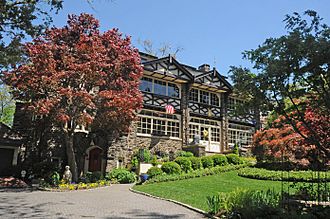Oaks Cloister facts for kids
Quick facts for kids Oaks Cloister |
|
|---|---|

In April 2019
|
|
| General information | |
| Architectural style | Tudor Craftsman Beaux-Arts, Renaissance Revival |
| Location | 5829 Wissahickon Ave Philadelphia, PA 19141 |
| Town or city | Germantown |
| Completed | c1904 |
| Renovated | 2002-2012 |
| Design and construction | |
| Architect | Joseph Miller Huston |
| Designations | Pennsylvania Registry of Historic Places |
| Renovating team | |
| Other designers | Dr. Russell Harris and Mr. John Casavecchia |
|
Oaks Cloister
|
|
|---|---|
|
Historic Pennsylvania home
|
|
| Country | |
| State | Pennsylvania |
| County | Philadelphia County |
| City | Philadelphia |
Oaks Cloister is a historic mansion in Philadelphia, Pennsylvania. It was once the home and studio of a famous architect named Joseph Miller Huston. He designed the Pennsylvania State Capitol building.
Built around 1900, Oaks Cloister is located in the Germantown area of Philadelphia. The house has a unique Tudor style. It also includes special design elements from the Capitol building. Oaks Cloister was fully restored in 2012. It was added to the National Register of Historic Places in 2019.
Contents
A Look Back: Oaks Cloister's Story
The Huston Family's Home (1900–1955)
Joseph Miller Huston was born in Philadelphia in 1866. He studied architecture and graduated from Princeton University in 1892. A few years later, he started his own architecture firm.
Huston designed Oaks Cloister himself. He blended different styles, like English Tudor and Swiss Chalet. He even worked on parts of Oaks Cloister while building the Pennsylvania State Capitol.
The mansion became a kind of "test lab" for the Capitol's designs. Huston used scaled models and similar details in both buildings. He lived at Oaks Cloister until he passed away in 1940.
New Owners and Neglect (1955–2002)
Oaks Cloister stayed in the Huston family until 1955. Then, Reverend Wilbur and Mrs. Loice Gouker bought it. They worked hard to keep the house's history alive. A short video about the home was even made during their time there. It was called "Oaks Cloister—The Home of Capitol Architect Joseph Huston."
After the Goukers sold the house around 1994, it started to fall apart. The property was eventually left empty and uncared for.
Bringing it Back to Life (2002–2012)
For many years, it looked like this important house might be torn down. But in 2002, Dr. Russell Harris and Mr. John Casavecchia bought the property. They saved it from being demolished.
It took more than ten years of hard work to restore the mansion. Bringing it back to its original beauty was a huge job. But this dedicated effort also brought many rewards. Hidden treasures were found and brought back to life during the restoration.
Every part of the 20-room mansion, which is over 100 years old, has been restored. Here are some of the most impressive areas:
- The Ballroom: This was one of the biggest restoration projects. The ceilings and carved panels were covered in thick dirt. It was discovered that Huston had brought the hand-carved stone fireplace from Caen, France. People believe it's a copy of a royal fireplace in the Cluny Museum in Paris. Legend says the original was made for King Francis I in the 15th century.
- The ballroom also has a golden coffered ceiling. It took 25,000 sheets of gold leaf to restore!
- There's also a gold mosaic tile wall-niche. It holds a sculpture called "Venus in the Waves" by George Grey Barnard. Huston also asked Barnard to create sculptures for the Pennsylvania Capitol.
- The Sitting Room: Above the fireplace, there's a mask made from a sculpture called "Boar's Hunt." The original wooden panel is at Mercersburg Academy. It was carved by the famous sculptor, Alexander Stirling Calder.
- Main Staircase: This grand staircase is right at the entrance.
- Master Bedroom: You can find this on the second floor.
- Dining Room: This is on the first floor.
- Music Room: Also located on the first floor.
- Rathskeller: This underground beer hall was added to the house after 1901.
A Place for Events
Because of its great location, large rooms, and interesting history, Oaks Cloister has become a popular place. Many groups and special events use it as a meeting venue.
Historical Recognition
State Historical Marker (2005)
A Pennsylvania state historic marker was placed at Oaks Cloister on October 20, 2005. It tells visitors about Joseph Huston and his famous home.
National Register of Historic Places (2019)
Oaks Cloister was officially added to the National Register of Historic Places on April 22, 2019. This means it is recognized as an important historical site.
 | Dorothy Vaughan |
 | Charles Henry Turner |
 | Hildrus Poindexter |
 | Henry Cecil McBay |


